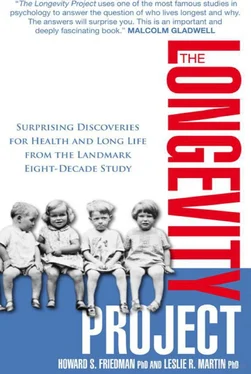This startling finding about neurotic men serves as a good reminder of just how complex the interactions are between internal characteristics (such as personality) and external factors (such as bereavement). Only looking at individual life paths over the long term allows us to properly understand these kinds of health threats and benefits.
What It Means for You: Guideposts to Health and Long Life
Women significantly outlive men, not only among the Terman participants but in almost any group. The reasons for this difference are complicated, and no one has yet fully explained them all. But our studies of the Terman men and women across the decades have yielded some tantalizing clues. Although the average man lives a shorter life than the average woman—five to seven years shorter—there is quite a bit of overlap and variation.
One might have guessed that the more masculine women, who got out and took charge of their lives, would have outlived the women who liked more traditional, home-based activities like interior decorating and working with children. But this was not what we found. One might also think that among the men, it would be the jocks and sports fans who stayed fit and lived long. But here again, that was not what happened across the decades. For most, femininity was more protective and masculinity was more dangerous.
James’s nurturing of his more feminine side—for him, theater and music—led him to develop a great network of friends and a close family. Yes, he was sensitive and a worrier, but that helped him cope well with his challenges, including the death of his wife.
Overall, in various studies, we repeatedly discovered that the women would generally recover and thrive even if they lost their men, whether by divorce or widowhood. Longevity often seemed to come down to social relations. The women and the less masculine men were better able to establish and maintain deeper social connections, which often saved their lives.
Our use of data-derived notions of masculinity and femininity made it clear to us that it is an especially good idea to nurture one particular feminine quality: social connectedness. Over and over in our research we have seen the value of social networks. Healthy aging involves maintaining contact with family and community. Meaningful bonds with others are part of the reason that being active in one’s religious congregation is healthy. A close, loving relationship with one’s spouse promotes long life. And, in the case of those who endured parental divorce during childhood, establishing good social relations helps blunt the risk associated with that stressful experience.
In today’s world the benefits of traditionally masculine qualities are obvious—those who are independent, aggressive go-getters tend to do well in their careers. The success they enjoy is something tangible and readily apparent. The benefits of traditionally feminine characteristics, however—especially being able to develop close social ties—are not always so easy to see. And yet it is precisely these qualities that buffer against life’s hardships. Both men and women can often benefit from strengthening the interpersonal bonds that the more feminine people seem to find easier to nurture. And parents can help their children develop close ties by modeling empathic relationships in their own lives.
Such findings prompt a rethinking about one’s personal characteristics and habits within particular situational contexts. Some believe they must be perfectionists, finding all the right behaviors and training themselves to do them; however this often results in feelings of exasperation when the “correct” personality characteristics don’t come effortlessly. But we discovered that relevant strengths often appear unexpectedly. It is the lifelong developmental path, traveled by the self-aware individual who is willing to make thoughtful adjustments, that eventually has the highest chance of leading to long life. And more than that, certain personality traits and habits that you might think of as detrimental (such as being a worrier like James), once the tides have shifted, can become exactly the thing that keeps you alive. The Terman participants thus taught us that it is not always sensible to define a complex personality characteristic like neuroticism as “good” or “bad.” The anxious, worrying moodiness that is less than ideal in some contexts was of benefit to men who lost their spouses and were left to fend for themselves.
Many fascinating aspects of gender, masculinity, and femininity remain unexplored. The adventurous, independent Shelley Smith Mydans, who was said to have had more stressful adventures than a soldier of fortune, lived a very long life but was survived by her husband. This case and several others like it raise an intriguing question: Does it matter not only how masculine or feminine you are, but also how masculine or feminine your partner is? Would a more masculine woman be healthier with a more masculine or more feminine partner? As far as we know, this question has never been seriously studied in this way.
CHAPTER 14
The Toll of War and Trauma
Why Some Thrive
In 1941 Philip became a soldier. Like about 350 of his fellow male Terman study participants, he served in the Second World War. About half of these men were mustered into the armed forces as privates, but many entered as officers. One became a brigadier general. Five of the participants were killed in the war, including one who was taken prisoner by the Japanese at Corregidor and died while being moved to a prison camp in China. But many more were indirect casualties , dying in later years partially as a result of their stressful wartime experiences.
Stress is often viewed as the boogeyman—the terrifying specter—of modern life. Watch out or it will get you! Yet many people face very challenging new circumstances, even war and terrorism, and do just fine. Many elderly veterans remember the awful pressures and traumas but thrive in good health. Why do others succumb? The astonishingly rich decades of data helped us to understand not only why many veterans thrived—but also why anyone who faces a traumatic challenge might very well be able to recover, prosper, and flourish.
Philip and many of the Terman men in the armed forces served in combat, but a significant number served in support roles. Some went overseas while others served in Washington, D.C., or on home bases. Many others contributed to the war effort in their civilian roles, especially as aircraft engineers, architects, chemists, and administrators, both inside and outside government. What they did and why they did it made a huge difference to their later health.
In Philip’s case, the war cost him dearly. As a child in 1922, fidgety Philip was described as charismatic and a bit vain, not particularly diligent for a smart student, and somewhat prone to anxiety. He was not one of the more conscientious Terman children, but with his intelligence and engaging interpersonal style he got along well. After he married Arlene in 1935, he was quite content sharing their interests in music and social activities. They had a baby girl, Margaret. But despite his good health, loving family, and steady work, Philip remained uneasy, according to his parents. His own self-assessment in 1940 corroborated this, suggesting that his childhood tendencies toward neuroticism and low conscientiousness had carried through into adulthood. In their 1936 report, his parents noted Philip’s apparent inability to save and be prudent with money, despite the tough economic times.
Philip joined the war effort and was soon a noncommissioned officer bound for the Aleutian Islands. By the time he returned home, in 1945, he had been swept far south and had seen combat in the Philippines, Guadalcanal, and the Solomon Islands. In addition to the stresses of combat, Philip felt the pain of the long separation from his wife and daughter. Shortly after his return, he reported feeling ambivalent about his wartime service. Although he realized that there were positive aspects to his service, he was frustrated and resentful over his circumstances and felt that both his child and his marriage had suffered as a result of his absence.
Читать дальше











